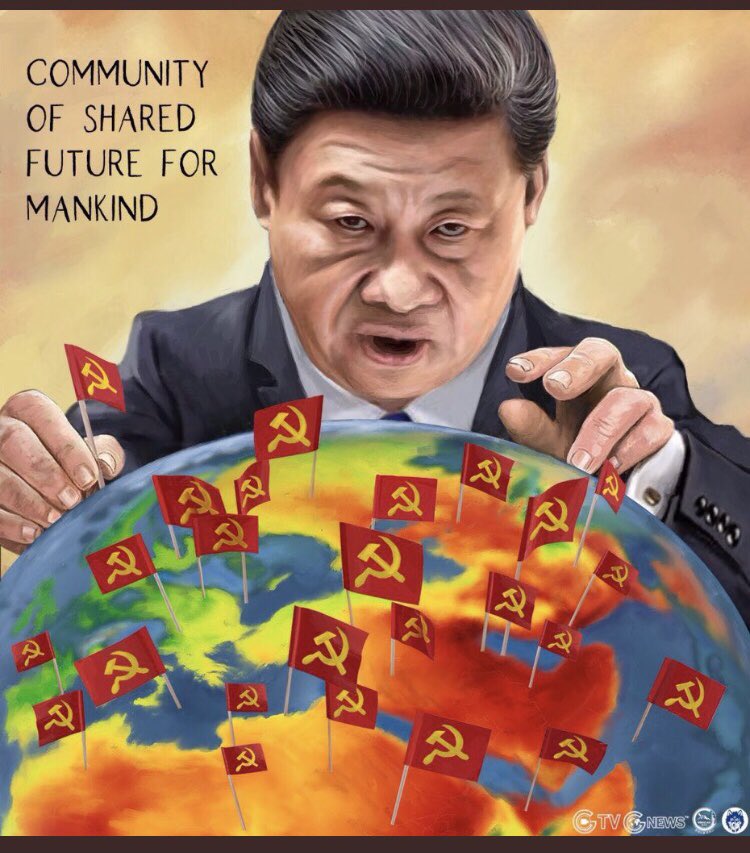Occupying the UN - What a Community of Common Destiny will look like
Around 2005, our Chinese government students in Chicago were quite interested in our notions of NGOs. They had a tough time with NGOs like community organizations that received most or all of their funding from the local government, and then sometimes took positions directly opposed to local government proposals. In Chinese terms, WTF?
When they learned that community organizations were legal entities with an elected board of directors, they were flummoxed. Who voted? Who allowed them to vote? Who could be a candidate? How could an organization be legitimate without government sponsorship?
Back then, up to about 2015, foreign NGOs were operating in China. There were government-sponsored NGOs as well. Now, only government sponsored NGO remain. If there are foreign NGOs, they are required to have a government sponsor. Since then China has learned to create dozens of government-sponsored NGOs to push its interests while hoping that no one looks too deeply at funding sources or Party affiliation of NGO leaders.
This sort of bamboozle-ment is far more dangerous than any IP theft or business cheating or balloon brouhahas. I have argued elsewhere that one can view Chinese as a people occupied by CCP. Xi wishes to occupy international organizations as well. It is surprising the extent to which China has succeeded in that occupation. The Wall Street Journal has a good analysis from 2020 - How China is Taking Over International Organizations - One Vote at a Time.
Xi Jinping has repeatedly envisioned an international system with the U.N. “at its core.” What the U.N. says matters a lot to the Chinese government.
Now comes CCP in response to questions from the UN Committee on Economic, Social, and Cultural Rights (CESCR). The CCP response – and those of its favorite home-grown NGOs - will obfuscate, lie, and ignore the long list of human right violations, including disappearances, tortures, murders, and threats compiled each year by legitimate non-profits like the Network of Chinese Human Rights Defenders (CHRD). Such organizations are a nasty bump in the road to the world of common future.
From William Nee at The Diplomat - How China Tries to Bamboozle the United Nations -
Next week in Geneva, on February 15-16, the Chinese government will be testing the international community again – specifically the U.N. Committee on Economic, Social and Cultural Rights (CESCR) Beijing will seek to defend its compliance with the International Covenant on Economic, Social and Cultural Rights and its record in protecting these rights since the last review in 2014.
And while there certainly has been some progress in the past nine years, the Chinese party-state will seek to present a happy, alternative reality that denies many indisputable facts.
For the upcoming CESCR review, at least 23 GONGOs or other entities tied to the party-state submitted reports to the Committee as “civil society organizations” – compared with just four such submissions for the 2014 CESCR review. Like fake Luis Vuitton bags at a bootleg market, these fake NGOs flood the market and diminish the value of the real products. Committee members waste valuable time reading their reports, listening to their interventions, and trying to decipher which NGOs are real and which are fake.
Xi probably doesn’t need to worry too much about the UN Committee’s vote. One of the Committee members is Shen Yongxiang, who holds a position as vice president of the China Society for Human Rights Studies (CSHRS), a key government sponsored organization for external propaganda on human rights issues for the party-state.
This is the Chinese position paper from 2022 on questions posed by the UN Committee -
Back around 2005 I thought the interest of our Chinese government students in NGOs was principally academic. Maybe. Maybe not. Perhaps they had a much more instrumental interest. I thought we taught them well. But then again - the concept of an NGO is that it is independent of government - a non-governmental organization. I guess we failed at teaching that. Civil society as we know it is not coming to China anytime soon.

N.B. I am reminded that the terms civil, and civil society, can be difficult to render in Chinese.
Richard Madsen tells us
In contemporary Chinese, for example, there are no fewer than four words that are used to translate the civil in civil society. Alternatively, Chinese intellectuals today call civil society shimin shehui, which literally means “city-people’s society”; or gongmin shehui, “citizens’ society”; or minjian shehui, “people-based society”; or wenming shehui, “civilized society.” These are all attempts to name phenomena and to articulate aspirations that have arisen in an urbanizing East Asia linked to a global market economy.
Richard Madsen. Confucian Conceptions of Civil Society. Chapter 1 in Confucian Political Ethics, edited by Daniel A. Bell (2007), p 3. Available at http://assets.press.princeton.edu/chapters/s8573.pdf
Perhaps we should lower our expectations for CCP performance in international organizations. After all, we wish to be civil.
